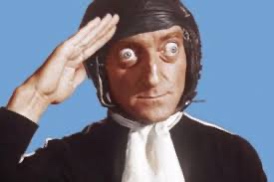
Few people under fifty will remember Marty Feldman but he was a prolific writer and performer responsible for some of the most innovative comedy ever
Mention Marty Feldman to anyone over the age of fifty and most would reply, ‘Was that him with the eyes?’ And that’s how he is remembered by most, by his unusual appearance. There are a number of theories as to why he looked how he did: Grave’s Disease, a botched operation after a serious car crash, being damaged through boxing in his youth but this misses the point about Marty Feldman completely. Yes, he did use his appearance for comedy purposes and he often said his unusual face was his fortune but it’s easy to forget that he was one of the funniest, most innovative and certainly most prolific comedy writers of the 60s and 70s. He was responsible for comedy that not only pushed the envelope for the time but he was also a prime mover in the satire boom as well as paving the way for the surrealism of the Pythons and many other comedy icons.
It will surprise many people that he died at the tragically young age of 48 of a heart attack brought on by food poisoning after eating shellfish while filming on Yellowbeard, a disappointing Python spin-off, in Mexico City in 1982. At his death he was well-known for being a Mel Brooks collaborator and Hollywood star but it’s the vast range of work in the 60s and 70s that really made his name and it’s that that this post will focus on.
Born in 1948 and brought up in East London before stumbling into comedy writing, he had a number of jobs that seem appropriate for a left-field comedy writer such as a tipster at a greyhound track and an assistant to an Indian fakir in a fairground sideshow act. Soon he was writing for one of the most inadvertently surreal productions of the 50s, Educating Archie, the radio ventriloquist comedy show. Here he worked with two stalwarts of British sitcom, writers Ronald Wolfe and Ronald Chesney (See Cor Blimey Stan, How Did You Do It?: On The Buses below). In 1954 he met Barry Took and they remained as comedy writing partners for the next twenty years. Their first foray into TV was writing some episodes of the hugely successful The Army Game and shortly after the spin-off Bootsy and Snudge. But in 1964 they hit comedy gold with the long-running radio show Round The Horne.
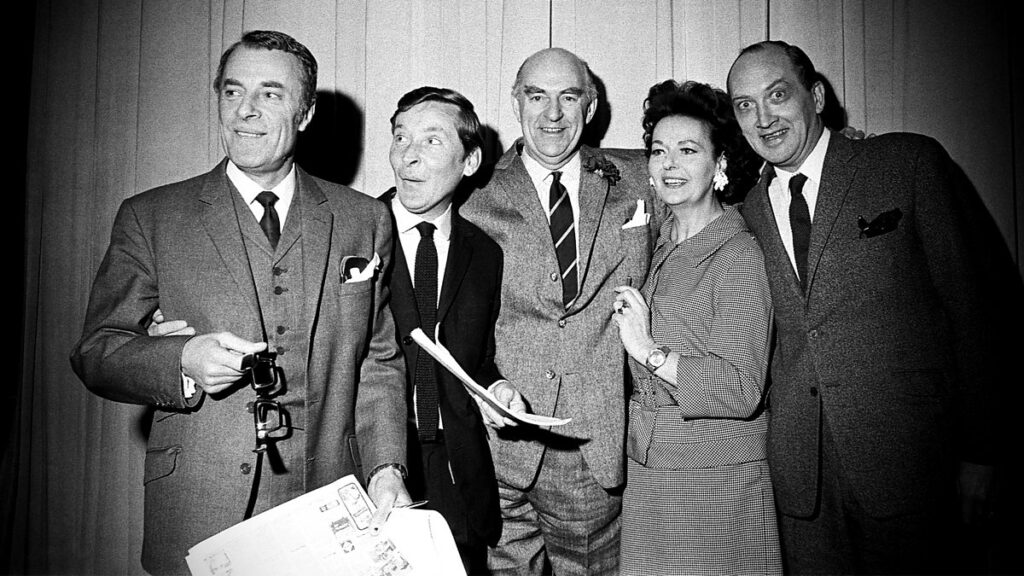
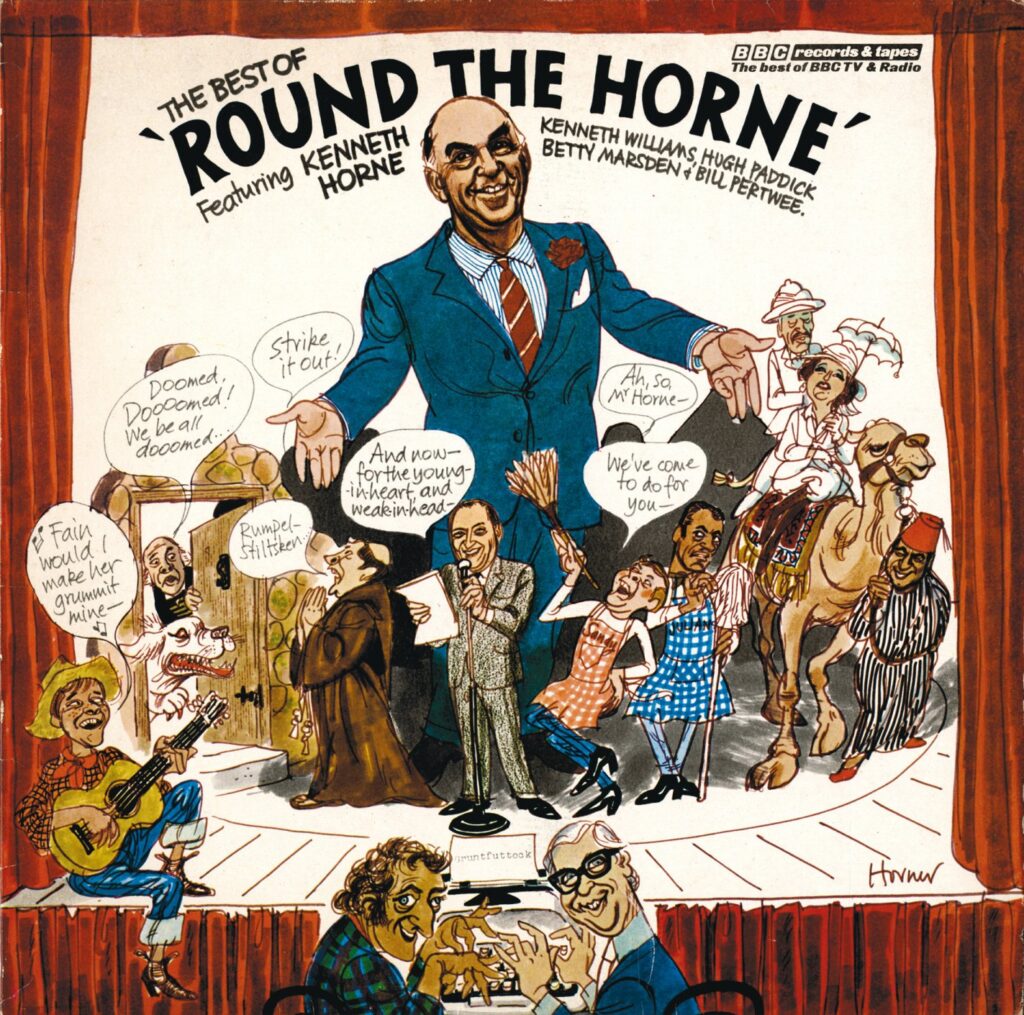
Described once as featuring ‘downmarket material in an upmarket way,’ Round The Horne was pure, unadulterated glorious filth. But it was filth in the way those wonderful Donald MacGill seaside postcards were. Everyone knew what they meant on Round The Horne, or at least thought they knew what they meant, but because it was all implicit they got away it. Even the title of the show was incredibly rude although it was hidden by a much less vulgar pun. Hearing repeats on BBC Radio 4 Extra it’s difficult to know how some of the jokes escaped the censor in those incredibly stuffy, buttoned-up times. But morality and that greatly abused word ‘decency’ was what the establishment claimed to be the social norm and the public requirement. But most people knew better. Despite complaints from some MPs and the inevitable Mary Whitehouse (who obviously understood the jokes if they were to find them distasteful), Feldman and Took were encouraged to be almost provocative in their groundbreaking scripts and this set the tone for Feldman’s work for the next 25 years.
The upper-middle class accent of the wonderful Kenneth Horne helped sneak much of the humour under the fence and the virtuoso cast of the great Kenneth Williams, Hugh Paddick, Betty Marsden and Bill Pertwee. As Kenneth Horne said, ‘If ever I see a double entendre, I whip it out.’ And RTH was well and truly stuffed with double entendres.
The most popular characters on RTH were Julian and Sandy played by Williams and Paddick. For a time when homosexuality was still illegal in the UK Feldman and Took rode roughshod through the (oppressive) laws of the land in a way that was not only brave but also hilarious. Using the gay secret language ‘palare’, Julian and Sandy’s dialogues pushed innuendo to its limits. Of course, in those days many people would not even have heard the word ‘homosexuality,’ let alone know what it meant. It was an aspect of society that was very much brushed under the carpet by those who were aware of it, hence the complete lack of awareness from most ordinary people. Feldman and Took’s genius, along with the brilliant characterisations of Williams and Paddick, made it mainstream and definitely ‘unthreatening’. They even managed to sneak many otherwise proscribed ideas through the script such as references to a ‘cottage upright.’ And if you don’t know what that is, use your imagination. It’s rarely wrong, particularly with regards to this brilliant show. Every character’s name had a hovering air of rudeness to it such as J. Peasmold Gruntfuttock, Rambling Sad Rumpo (Williams) and Daphne Whitethigh (Marsden). Even the studio orchestra was known as ‘The Hornblowers!’

Feldman and Took’s reputation as writers meant they were in high demand as scriptwriters for other shows. One of those was that Genxculture favourite, Tarbuck Memories: Sunday Night at the London Palladium. I have written about this weird variety experience at length elsewhere in this little blog space. In 1965 SNATLP was undergoing a facelift and was trying to drag itself into the happening 1960s through featuring acts that were certainly ‘with it.’ Peter Cook and Dudley Moore, Spike Milligan and even The Beatles rubbed shoulders with the more traditional screeching operatic singers and terribly predictable comedians. And talking about terribly predictable comedians or maybe just terrible comedians, there was new host Jimmy Tarbuck. His Liverpudlian background and cheeky chappie demeanour was a perfect new broom for a refurbished SNATLP. Feldman and Took as two of the most fashionable writers in the UK at the time were brought in to give the script a modern spin. They must have been up to their eyes (no pun intended, Marty) with Round The Horne as Tarbuck’s script is execrable and bears no resemblance to the cutting edge stuff they were producing for RTH. I can only imagine they accepted the job as it was well paid and met in a pub to cobble something together, probably on the back of a fag packet as Marty was a very heavy smoker. ‘Ringo and has wife have so much money they’re putting it into Zack’s‘ was one of the better gags, which says more about the rest of Tarbuck’s routine. It would be unfair to judge this script though given the fact that Tarbuck was probably unconcerned about the quality, he was just so happy to be there. As was said at the time, a Palladium audience would laugh at a horse defecating.
After three series of RTH Feldman’s own performing career was beginning to take off and his writing was moving in other directions and he left RTH.
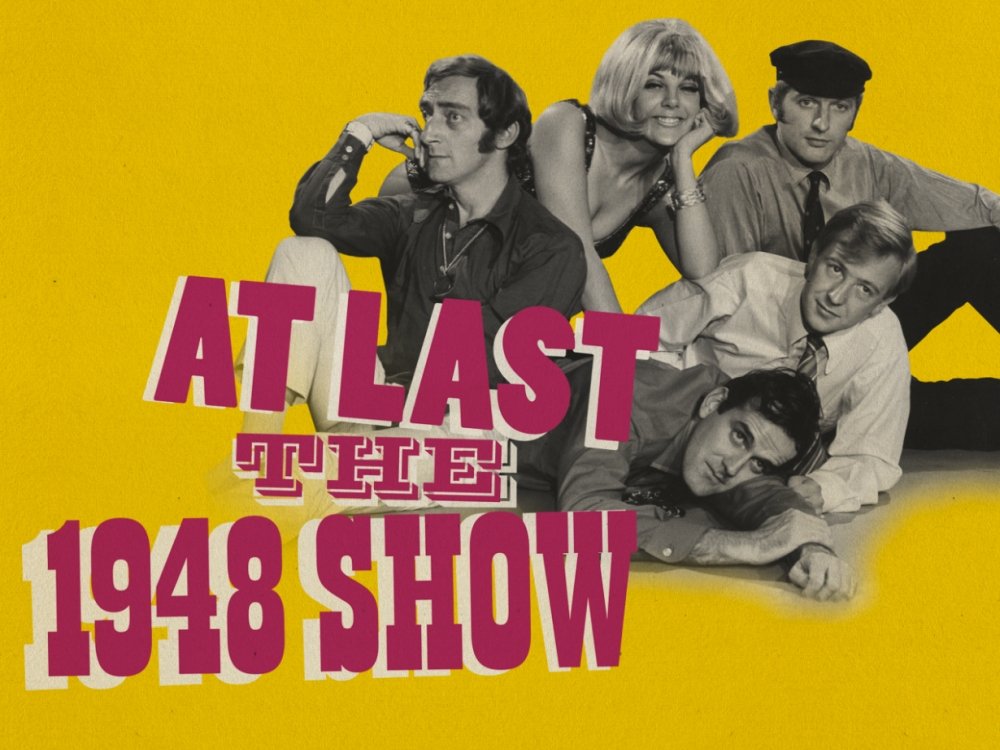
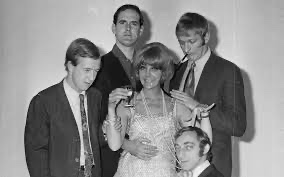
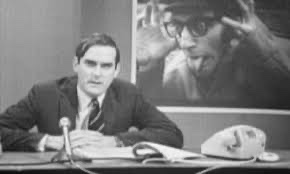
At Last The 1948 Show was Feldman’s first production as writer and performer. Initially the idea to produce an unconventional sketch show was that of David Frost who brought together a group of comedy actors and writers, some of whom had worked on The Frost Report, John Cleese and Graham Chapman along with sadly recently departed Tim Brooke Taylor, who then suggested Marty Feldman. A bit of good old fashioned 60s glamour was added through the lovely Aimi MacDonald (she was always referred to as ‘lovely’) who played the dumb blonde character, usually in sequins and feathers, and linked many of the sketches.
ALT1948S is a production which rarely is given the credit for being the first to usher in the winds of comedy change. Coming almost a year before the wonderful Do Not Adjust Your Set with Palin, Jones and Idle, many of the sketches eventually found their way to being performed on Monty Python including the legendary Four Yorkshiremen sketch and the programme’s main catchphrase, And now for something completely different. My memories of this show are sparse. I remember thinking it odd but, for me, that was a good thing. Even at the tender age of nine I was bored with formulaic sitcoms and wanted something more. The aspect of the show that really sticks in my memory was Aimi MacDonald’s links. Guest stars included a plethora of comedy writers of the time including Frank Muir and Denis Norden, Dick Vosborough and the great Barry Cryer. Ronnie Corbett (a colleague of Cleese’s from The Frost Report), Bill Oddie (shortly to team up with Tim Brooke-Taylor in The Goodies) and a non-speaking Eric Idle, also provide cameos. Other than two episodes it was believed all others were lost but all except two have been found, which is a turn up for the books! If Round The Horne brought innuendo and a stealthy social element to the airwaves, ALT1948S brought a satirical silliness to our screens which would be the spark to ignite a range of comedy programmes which pulled back the boundaries of humour, often pulling them back so far they were out of sight for many people. And from this seminal but almost forgotten series Marty Feldman’s public profile began to develop and so did his writing.

The period between 1965-70 was a prolific time for Marty Feldman. As well as Round The Horne he was writing for The Frost Report which starred a young John Cleese, Ronnie Corbett and Ronnie Barker, who would soon become The Two Ronnies (who Marty also wrote for), According To Dora starring the great Dora Bryan, The Dick Emery Show (along with another writer called Harold Pinter..yes, Harold Pinter), Terry Scott’s own sketch show Scott On…. and even scripts for It’s Lulu! Two almost forgotten shows of note he worked on which are worth mentioning were No, That’s Me Over There starring Ronnie Corbett and Henry McGee and Broaden Your Mind, another high quality sub-Pythonesque sketch show of the type which were being churned out in the late 60s.

No, That’s Me Over There was ostensibly a fairly formulaic middle-class suburban comedy, but a look at the production team suggests otherwise. Written by, amongst others, Barry Cryer, Graham Chapman and Eric Idle and produced by Marty, it’s a Reggie Perrin-type of comedy with Ronnie Corbett in his first starring role. Sadly, most of the first two series have been lost although one episode is available on Youtube. Marty contributed to the scripts of Broaden Your Mind, one of the first colour programmes to be broadcast on the fairly new BBC2, was a suitably daft precursor to The Goodies starring Tim Brooke Taylor, Graeme Garden and Bill Oddie. One surviving sketch, ‘Ordinary Royal Family‘ appears to have Marty’s iconoclastic fingers all over it. Very funny and available on that thing they call the Youtube.
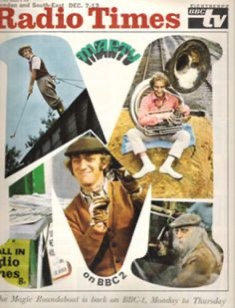
Launched in 1968 Marty! (and for the second series It’s Marty!) was Feldman’s own sketch show which allowed his writing to develop and flourish in an unconventional and often anarchic style. Following on from ALT1948S the sketches in Marty! were of an altogether more surreal nature than those on the more mainstream Dick Emery or Mike Yarwood Shows, for example. Feldman took John Cleese and Graham Chapman from ALT1948 and Michael Palin and Terry Jones from Do Not Adjust your Set and The Frost Report with him to supplement Feldman and Took’s contributions. At various points along the two-series way Tim Brooke Taylor, John Law and John Junkin (who also appeared in both series) also weighed in. The result was a wonderfully scattergun and hilariously strange concoction. One sketch I remember vividly was ‘Lightning Tours‘ where Marty played a recurring character, an irritating little man in long coat to his feet, an even longer scarf wound around his neck and a bowler hat. John Junkin was the tour guide and the tour took place on a coach being driven through the English countryside at breakneck speed. Very funny! Maybe even a skit on the recently broadcast Magical Mystery Tour?
In another suitably nutty sketch an elderly couple are in bed and the old man gets up go to the toilet, next thing we see him speeded up in a car to meet a beautiful girl each time in an increasingly unlikely situation. At one point flying off on a plane, landing on a tropical island, playing the guitar to a dancing island girl and then we see his journey back and ending with him slowly re-entering the bedroom where his little old lady wife is still reading and still berating him in bed. The punchline being he’s too tired each night to make love to her. With Marty and Took writing along with most of the soon-to-be Python team, the sketches were surreal, absurd, highly stylised and extremely funny. At the end of the second series of It’s Marty! all went their separate ways to Python, The Goodies and Feldman was poached by ITV.

The success of Marty’s TV shows and his prodigious writing output eventually got him his first film in 1970, Every Home Should Have One. Produced by That Was The Week, That Was’s Ned Sherrin and written by Marty, Barry Took and Denis Norden, this satire on advertising was Marty’s first serious mis-fire. And it was a bad mis-fire. A uncomfortable juxtaposition of satire, slapstick and antediluvian sexual politics and although having some interesting points to make about advertising and morality, this swipe at the Mary Whitehouse morality faction completely misses the point. Marty is an advertising writer and decides the way to sell frozen porridge is through sex. So far, so 70s. But by ‘sex’ we’re really talking about the exploitation of young attractive women while all the men in the film are middle-aged, sweaty, leering beasts. One particular character played by Shelley Berman, a middle-aged, unattractive advertising executive is girl-mad! And one of the recurring ‘jokes’ is about all the young attractive girls he beds who all want a job from him. So far, so Harvey Weinstein. Later Marty’s character has an affair with the family’s very attractive Scandanavian Au Pair (only in the 70s did well-off people have ‘Au Pairs’) Julie Ege and his wife (the excellent Judy Cornwell, see Adrienne Posta: The 70s ‘It’ Girl) takes it not quite as badly as most women would or should. It’s a film that today leaves a rather nasty taste in the mouth, although that sounds like a comic line from the film.
The film did have an excellent cast of tried and tested British character actors like Judy Cornwell, Penelope Keith, Dinsdale Landen, Patrick Cargill and Michael Bates but the script lacked the sophistication, innovation and comic invention that Feldman and Took were synonymous with. One can’t help thinking that Marty saw this as his big chance to get to the next level and didn’t want to take any chances of being too clever for the British cinema audience weaned on Carry Ons and On The Buses. To be honest, Carry On Up The Jungle and Carry On Loving, released within the same year as EHSHO, were much funnier as they didn’t try to have intellectual pretensions. That said EHSHO was one of the most successful films of 1970 in the UK. There was no accounting for taste in the 70s and sweaty, revolting, unattractive old men being successful with young girls was the norm in British cinema and TV. It would be unfair to put all the blame on Marty for this execrable mess but he was about to make the connection with Hollywood he so badly desired through his next, and final, TV project.
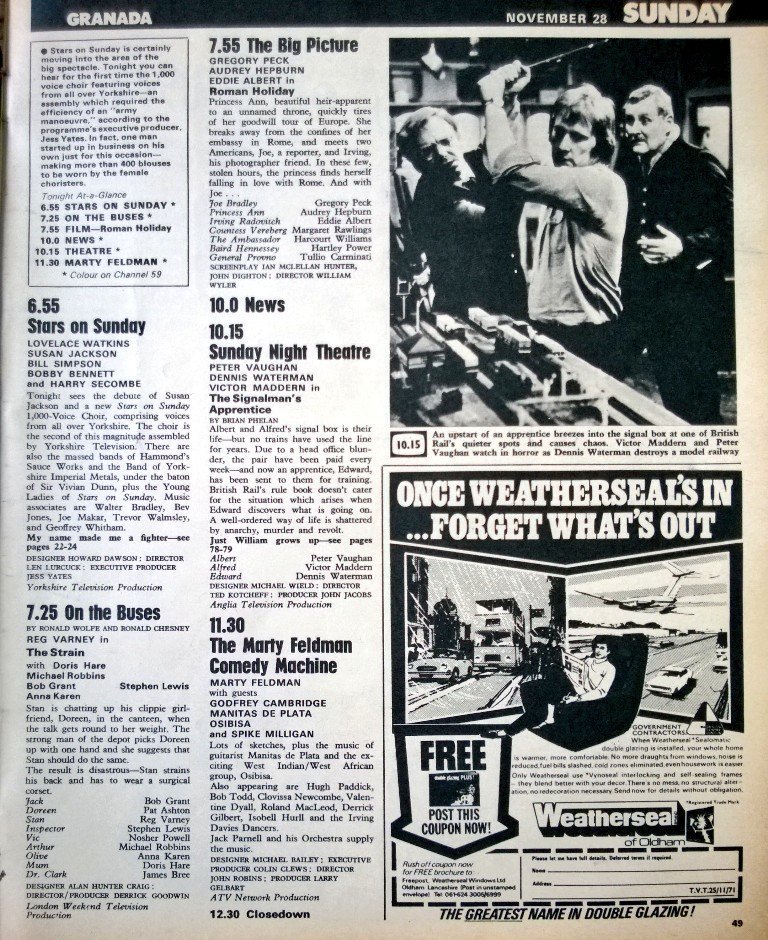
Although rarely interviewed Marty had very strong opinions about many things and was very much on the left of the political spectrum. In 1971 he gave evidence for the defence in the Oz trial and caused gasps of surprise when he refused to swear on the bible to the utter disapproval of the judge who clearly hadn’t come across people who refused to tow the establishment line. Throughout the case Marty aimed jibes at the old fossil sitting on the bench, cementing his radical credentials. Around this time Marty’s growing public profile also made it into an iconic film of 1971. In Kubrick’s A Clockwork Orange (See A Clockwork Orange post below) when Alex, played by Malcolm MacDowall, returns to his family home after a period in prison, his dad, played by Genxculture favourite Philip Stone, is reading a newspaper with the strange headline ‘Marty Feldman’s Wife Banned.’ Where this headline came from is anyone’s guess but it’s this type of bizarre trivia that make articles like this interesting. Although I would say that, wouldn’t I?
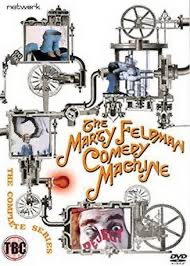
By this time America was beginning to take notice of Marty and his new vehicle, The Marty Feldman Comedy Machine was partly commissioned by the ABC network. There are different takes on how Marty had become known in the US. One suggestion was that At Last The 1948 Show had been reasonably successful there but more plausible, I feel, is that MASH writer and producer, Larry Gelbart, had been living in London at the time and had spotted Marty. It was his idea to get together with Lew Grade at ITV and ABC in the US and produce a more upmarket vehicle for Marty that could be shown in America as well as the UK. The result was Marty Feldman’s Comedy Machine which although only partially successful on both sides of the Atlantic, would be his calling card to Hollywood. The show itself was a curious concoction of American glitz and British comedy talent. Keen to appeal to both markets, a dizzying range of British and American talent was drafted in at considerable cost but although some of the American stars were household names in the US, some were virtually unknown in the UK and vice versa. Looking at it now it seems a strange brew with the great Beryl Reid on one hand and Orson Welles on the other, Round The Horne’s Hugh Paddick in some shows and Roger Moore in another. It was hugely impressive to have featured Orson Welles and Groucho Marx though, for example. And what would the Americans have made of Spike Milligan, who also wrote for the show? Terry Gilliam also did some Pythonesque animations which added an interesting element.
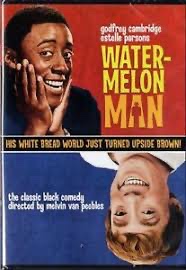
Another interesting guest was Godfrey Cambridge, a black actor and comedian little known in the UK. His most well known film role was in 1970’s The Watermelon Man about a white bigot who woke up one day and his skin had become black. Cambridge played both parts and, though rarely seen today, it had some very prescient points to make about black peoples’ experiences in the U.S. during the 60s. Like Marty, Cambridge, at the height of his success, died at the tragically young age of only 43 of a heart attack.
Producer and writer Larry Gelbart and Marty did not always see eye to eye (sorry Marty, no pun intended) and the production was often a little fraught. It took Marty away from the mainstream (or as mainstream as it was possible for him be) and this slightly more daring and certainly innovative comedy was not only an hour long but was also given a late night broadcast slot on ITV. Although reasonably successful in the UK it didn’t really take off in the US despite the high production values and glittering guest roster. But Marty had his eyes on the prize (sorry Marty..) of American recognition and it led to some very strange guest spots over the next few years.

Offers to appear on US comedy and chat shows started flooding in and Marty guested on The Dean Martin Show four times in 1970 and ’71 along with a long line of shows we didn’t get in the UK such Carol Burnett, Flip Wilson, Bill Cosby, Mac Davis, Johnny Carson (4 times) and even Cher! It’s fair to say Marty was in demand. During the mid-seventies Marty also made a number of appearances on Hollywood Squares (Celebrity Squares to us) alongside the likes of Lee ‘Catwoman’ Merriweather, Vincent Price, Kelly Monteith (whatever happened to him?) Lynne Redgrave and Dionne Warwick. My favourite of Marty’s guest appearances in the US was as the ‘mystery guest’ on ‘What’s My Line‘ which also featured strange bedfellows ex-President Jimmy Carter and screen legend Joan Fontaine. He even acted in a U.S. TV version of the classic 40s Hollywood screwball comedy ‘The Man Who Came To Dinner‘ playing the part originally played by the great Jimmy Durante, ‘Banjo.’ This I would love to see!
It was a far cry from Round The Horne with Kenny Williams and Betty Marsden. Marty had hit the big time! It wasn’t long before Mel Brooks with Young Frankenstein and Silent Movie would come calling and Marty would become part of the Hollywood establishment. But that’s another and not quite so interesting story.
To look back on Marty Feldman’s eye-popping (sorry…) but tragically curtailed career is to look back on the golden age of British comedy. As well as laying the foundations for the new breed of surrealist, iconoclastic comedy that was Monty Python, he was up there with Galton and Simpson, Spike Milligan, the Pythons, Clement and Le Fresnais and David Nobbs as one of the great writers of TV comedy. Although his latter career was patchy and sometimes lacked the cutting edge of his earlier work, he was still hugely successful, he did become a household name and he did become more than just ‘.. him with the eyes.’ And although few people under 50 will remember Marty, the legacy of his comedy lives on.

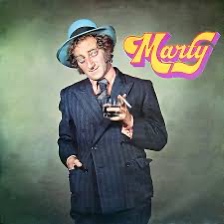
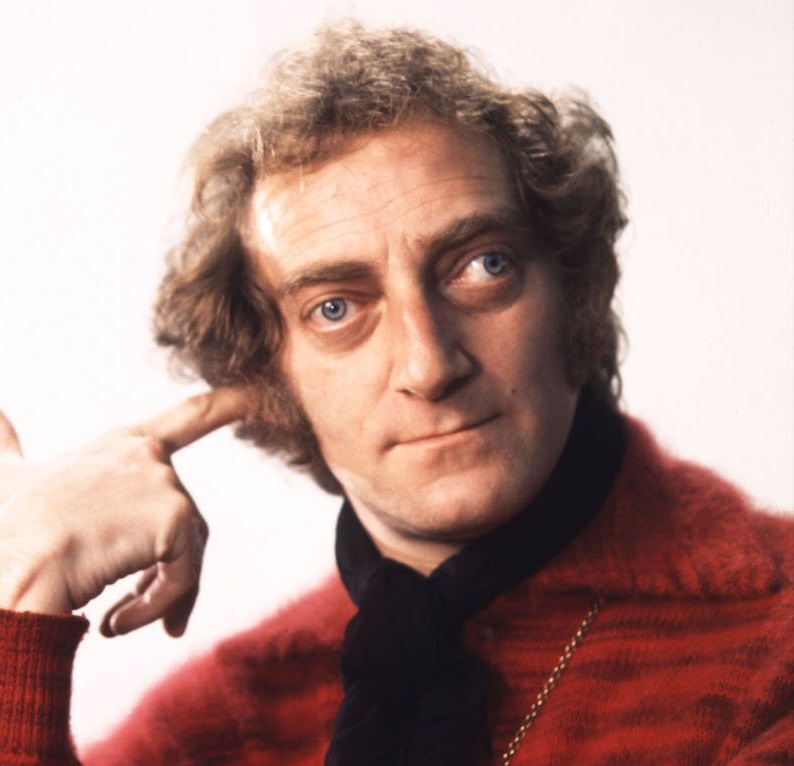
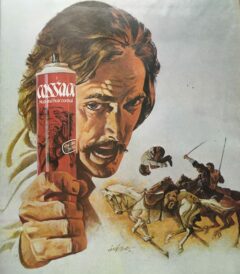
[…] Marty Feldman: A Criminally Forgotten Comedy Genius […]